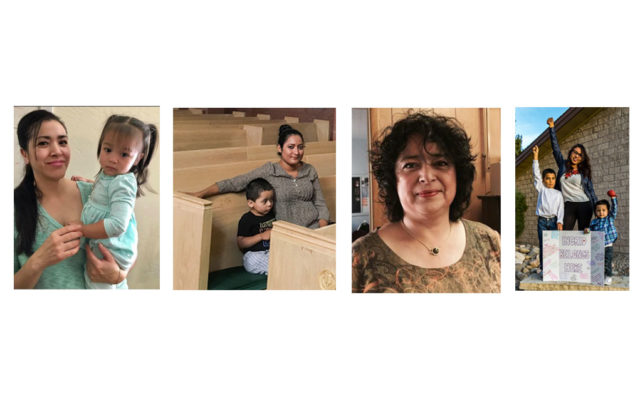
In the face of increasingly hostile immigration policies, a record number of undocumented immigrants have claimed sanctuary in churches and communities of faith around the country in the last year. But they are not hiding.
Resolved to stay with their families and in their communities, many of these immigrants have become outspoken advocates for change. There are currently four women living in sanctuary in Colorado, one each in Mancos, Denver, Carbondale and Boulder. On March 8, International Women’s Day, they are launching a “people’s campaign,” asking individuals, as well as businesses, community groups, law enforcement agencies, faith communities and elected officials, to endorse a resolution that they hope will provide a blueprint for legislators to make policy changes.
“We realized that uniting would give more strength to the movement,” says Ingrid Encalada Latorre, who has been in sanctuary in three different churches in Colorado since November 2016. She’s been at the Unitarian Universalist Church of Boulder since mid-December. “And the reason unifying the four of us is more powerful is it unifies the state from north to south, unifying the churches that support us as well as the communities.”
Each woman’s case is unique, but there is little, if any legal recourse for any of them. The new campaign sets out what the women and immigration advocates say are simple solutions to their legal issues.
“You hear so much about how the system doesn’t work or is broken or is complex, so there’s this feeling that this is a really difficult problem to solve,” says Jennifer Piper, interfaith coordinator for the American Friends Service Committee, which is helping to organize the campaign. “It has become a political football, but the solutions are actually not that hard. Even in just looking at these four cases there are some really simple changes that could be made that would create a path to status for them and for thousands of other Coloradans.”
For example, Araceli Velasquez’s husband has Temporary Protected Status, but that doesn’t include a pathway to citizenship for him or a way for her to obtain any sort of legal status. Latorre is not eligible to apply for status either, despite the fact she has U.S.-born children and a citizen aunt. Same for Sandra Lopez, who has U.S.-citizen children and has lived in Colorado for almost two decades. She’s been at the Two Rivers Unitarian Universalist Church in Carbondale since November 2017. And Rosa Sabido has been waiting more than 17 years for a family reunification visa to be approved, but given the immense backlog of the system, as well as the limited number of visas allowed, she could be waiting several more years. She’s been living in the Mancos United Methodist Church since June 2017.
“We are working together and we’re going to be working with the community and our elected officials to change these unjust laws … putting pressure on Congress to make changes that would allow us to be free, to be liberated,” Lopez says via an interpreter from Carbondale, “to help thousands avoid sanctuary in the future.”
In the past, other immigrants in sanctuary have appealed to politicians for relief from deportation, but that has become increasingly tricky given the current political climate. Latorre, for example, appealed to lawmakers and government officials for help in her case to no avail. Most notably she petitioned Gov. Hickenlooper for a pardon, which he denied last year. The people’s campaign, on the other hand, hopes to galvanize a movement from the bottom up, with the goal of collecting 20,000 signatures to present to state and federal lawmakers before summer recess. The hope is that local and state officials can use their influence to motivate Colorado’s Congressional delegation to take action.
“A state can’t necessarily set federal policy but they can decide to what level they’re going to participate and use the resources of the state to carry out these federal goals,” Piper says. One such example is a Colorado law, first passed in 2013, that allows undocumented residents to obtain driver’s licenses and decrease the risk of being sent to ICE for minor infractions.
Ultimately, the four women hope the results of the new campaign will allow them to leave sanctuary without the threat of deportation. But they also recognize it isn’t just about them.
“In general, immigrants are facing more racism than ever and we’re seeing doors closed on us,” Lopez says. “My human dignity is not about having a piece of paper. I am a human being and that is the basis on which I have dignity. And every one of the 11 million undocumented immigrants has that same dignity. We have dreams, feelings, goals just like everyone else.”














